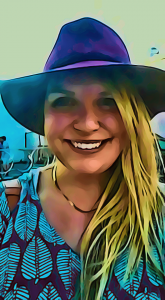227 Letter from Emily Yeager

Dear confrere,
I offer you two main insights that hopefully can advise you in a happy, healthy, and sane career as a future tourism researcher.
Family:
Some of you may be wondering, is it feasible to have a family while in academia? YES. Work life balance is a struggle in academia, but it is totally possible (although never perfect). If you are considering the path to parenthood while pursuing the career of academia, there are two actions that you can take to make achieving this goal easier.
- First, make an appointment with your institution’s human resources (HR) department to discuss your options for maternity leave. Each institution, state, and country differ but ultimately, HR will be a great place to start as they will know your options by heart. It is their job. At my institution, I was offered a pause on my “tenure clock” during my maternity leave. CAUTION, if you can avoid it, try not to view maternity leave as an opportunity to get ahead in the tenure process. In the U.S., our maternity leave is short. Don’t waste the time that you could have been bonding with your newborn worrying about what is waiting for you upon return. I remember finishing typing a book chapter with my left hand (I am right-handed by the way) while breastfeeding my son. I regret not planning ahead and using that hand to hold a historical fiction novel of my choosing.
- Second, carve out a firm “no-work” block of time in your day to spend with your family. Mine is from 5-8pm. Obviously, life happens, and you will have disruptions to these blocks of times (e.g., teaching a night class). In these cases, I just readjust my block of time (e.g., come into the office later to spend a little more time in the morning with my family). Setting boundaries signals commitment to your family but also helps replenish your mental and physical self from which you give to work and everything else in your life.
Work smarter not harder. This cliché is of utmost importance to maintaining your sanity in academia. I have found two methods which have helped amplify my research, teaching, and service at my institution without over-burdening my pursuit of tenure.
- We are lucky that tourism, whether you believe is a field or discipline (an internal debate sparked by Tribe (1997) in my early Ph.D. years), is interdisciplinary. Be bold and reach out to others on your campus from different departments, fields, and disciplines who hold expertise or interests that align with yours. Interdisciplinary collaborations can lead to innovative research and can be an avenue to larger funding sources. They will also challenge you out of your comfort zone which guards you from stagnation in your research agenda. In my first year of my current tenure-track position, I had at least one coffee appointment a week with a new potential collaborator across campus and in my own community to not only “advertise” my research interests but also my research skills. Sometimes, you may be invited to be a part of a project not primarily because of your research agenda, but rather you may have been asked also because of a specific skill that you possess (e.g., qualitative methods and analysis). CAUTION, it is ok to say no to collaborations as well. Sometimes interpersonal characteristics don’t mesh. Or, you simply do not have the time. While I often say yes, learning to say no is a constant battle for me.
- Teach what you research. Research what you teach. Serve your institution and communities in ways that can elevate both. In my realm of research, tourism is often synonymous with community development. Here is an example. In Spring 2021, my tourism planning class worked with our local CVB to develop a community engagement and asset mapping plan for a local African American Cultural Trail (AACT). Simultaneously, I collaborated with two colleagues who are experts in diversity, equity, and inclusion in tourism to develop a pedagogy research project to assess the transformative effect of working on social justice projects on students in tourism planning classes. I continue to serve on the advisory board for this local AACT and as such, have made so many meaningful connections with others in my community outside of the university. In another instance, in the first year of my current tenure-track position, I was very interested in improving my teaching by becoming certified in Universal Design for Learning (UDL). I joined a program at my institution that not only allowed you to earn a UDL certificate, but to also conduct pedagogical research with others across campus with the same interests. Three years later, our UDL group is running an interdisciplinary longitudinal study assessing the impacts of UDL informed instruction on students’ engagement and interest with course content. In short, create synergy in your career efforts as much as possible.
It is an honor to share these insights with you amidst such an assemblage of wisdom that is these letters. Forge your path boldly and proudly for you are competent and able!
Emily P. Yeager
East Carolina University, United States
References
Tribe, J. (1997) ‘The indiscipline of tourism’, Annals of Tourism Research, 24(3), pp. 638–657.



